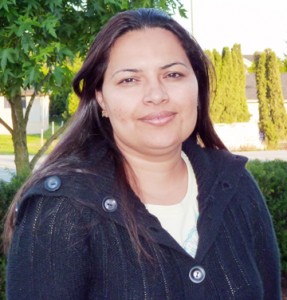Patient gratitude proves rich reward to BC nurse
Name: Roshni Sangha
Job Title: RN – Community Nurse – Richmond
Union: BCNU
Roshni was inspired by her aunt who was a nurse. “For a woman in India having a job meant she had power – financial power from work and respect,” remembers Roshni. Her parents encouraged her to have a career so she would be self-sufficient.
By the time she reached Grade 10, Roshni knew she wanted to become a nurse. “I just wanted to be a nurse, that’s it. My parents really supported my decision. My dad said ‘go and study whatever you like’. Yet other girls like me in small villages weren’t allowed to go anywhere alone. I was so lucky that my father had confidence in me and I am grateful for that even today. He was so modern. I would travel alone by bus to and from my nursing school and he would simply say ‘I know my daughter and she can handle herself.’
She studied nursing in Ludhiana, Punjab and came to Canada after marrying. Her husband and mother-in-law are both familiar with the public healthcare delivery system in Canada and are very supportive. “My husband took his paternity leave and cared for our two small girls while I completed my nursing exams here at Kwantlen College,” she remembers. “He took care of everything so I could succeed.”
Roshni took the nursing “refresher course” which is a 3-year course condensed into an intensive 9-month course that prepares Internationally Educated Nurses (IENs) to work in BC. She was hired at Richmond Hospital and worked there until 2005 when Roshni sought out a a change within her nursing career and now works as a Community Health Nurse in Richmond. Roshni sees patients of all kinds in their homes. She provides support for new mothers and babies, the frail elderly and for patients who have recently undergone surgery.
Roshni notes that “in Canada, we have very high expectations and responsibilities in nursing. This also means we have better outcomes for our patients here. Even though we are currently struggling within our public healthcare system with a shortage of nurses in Canada, everybody is treated equally. In other countries, if you have money you can get medical treatment but if you can’t pay you might not get medical care at all.”
She goes on to say that she “never worked as a member of a union until I came here. The BCNU sent information out to me as a student which I appreciated. So I am very grateful to be a part of a strong union, one that fights for its members rights and well-being as well as to protect public healthcare for everyone.”
“Every job has stress, and nurses have heavy workloads. But when a patient says “thank you” it is just so satisfying. I am glad when I can be there to help somebody through their difficult times. That is the difference between nursing and other jobs. Many days I come home after work and know that I really did good and meaningful work today.”
